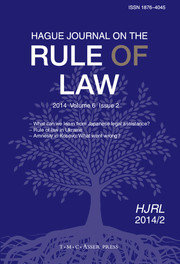Article contents
Communist State and Religious Policy in Vietnam: A Historical Perspective
Published online by Cambridge University Press: 10 October 2013
Abstract
Presently, the Vietnamese State is facing two challenges. On the one hand, it has to integrate the country into the free world market and its corollary of religious freedom, in order to provide prosperity to its people and to preserve its legitimacy. On the other hand, it has to deal with the growing influence of religious forces, which it suspects to embody opposition against the absolute power it has exercised since its victory after 30 years of war. This article discusses the Vietnamese religious policy and the Vietnamese Communist Party's (VCP) approach to religion from a historical perspective. Is the VCP's policy the result of a principled approach by a strong state based on an immutable atheist ideology or the result of a pragmatic approach by a state looking for legitimacy and regional and global integration?
The article demonstrates how a difficult context of a long state of war followed by economic reconstruction have produced a specific Vietnamese approach to religious policy. It analyses the process led by the Vietnamese Communist State to develop legislation in religious matters based on communist models (Soviet, Chinese), on legacies of more ancient models such as the Chinese Confucian policy of religious control, on its own historical experiences, but also on more recent Western models. While following communist ‘anti-religion’ models, Vietnam's policy has nevertheless been equally dictated by considerations of internal and external legitimacy, as well as by economic reasons.
- Type
- Articles
- Information
- Copyright
- Copyright © T.M.C. Asser Press and the Authors 2013
- 13
- Cited by


